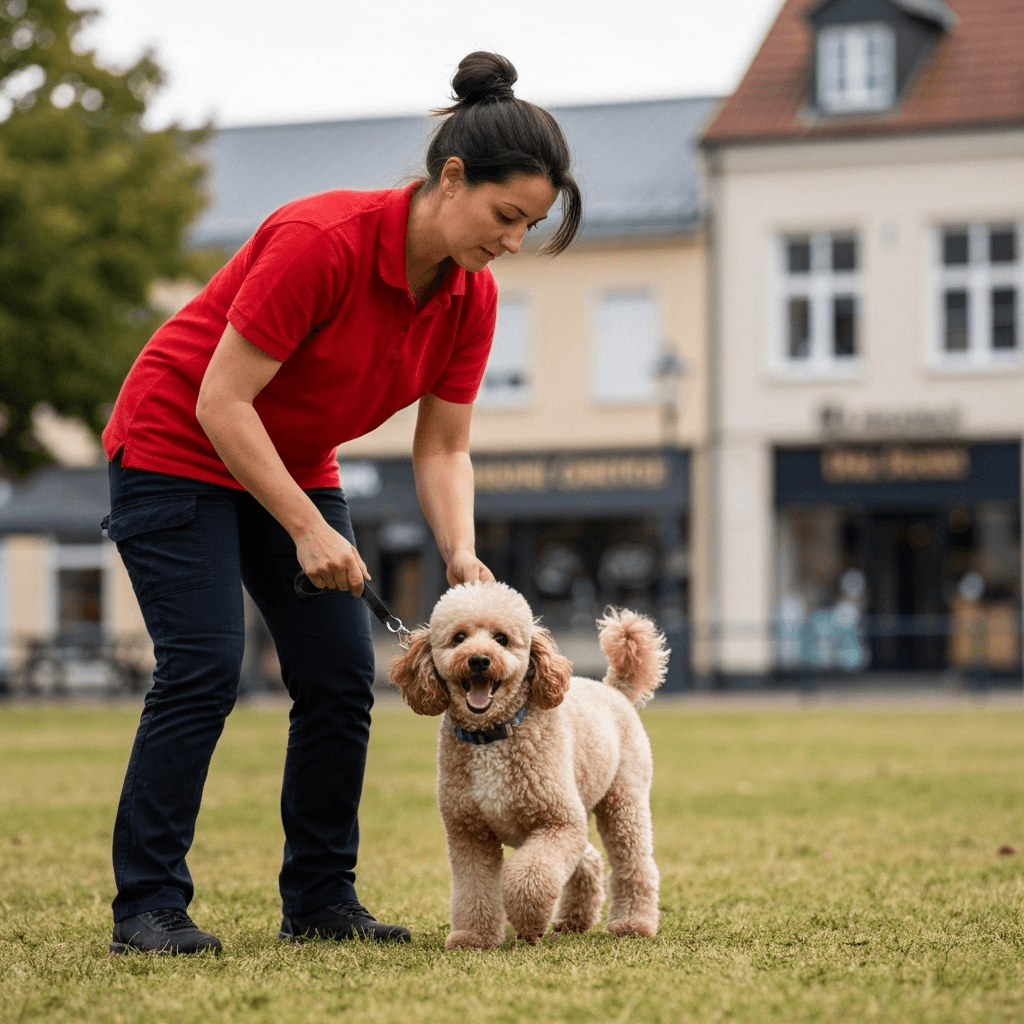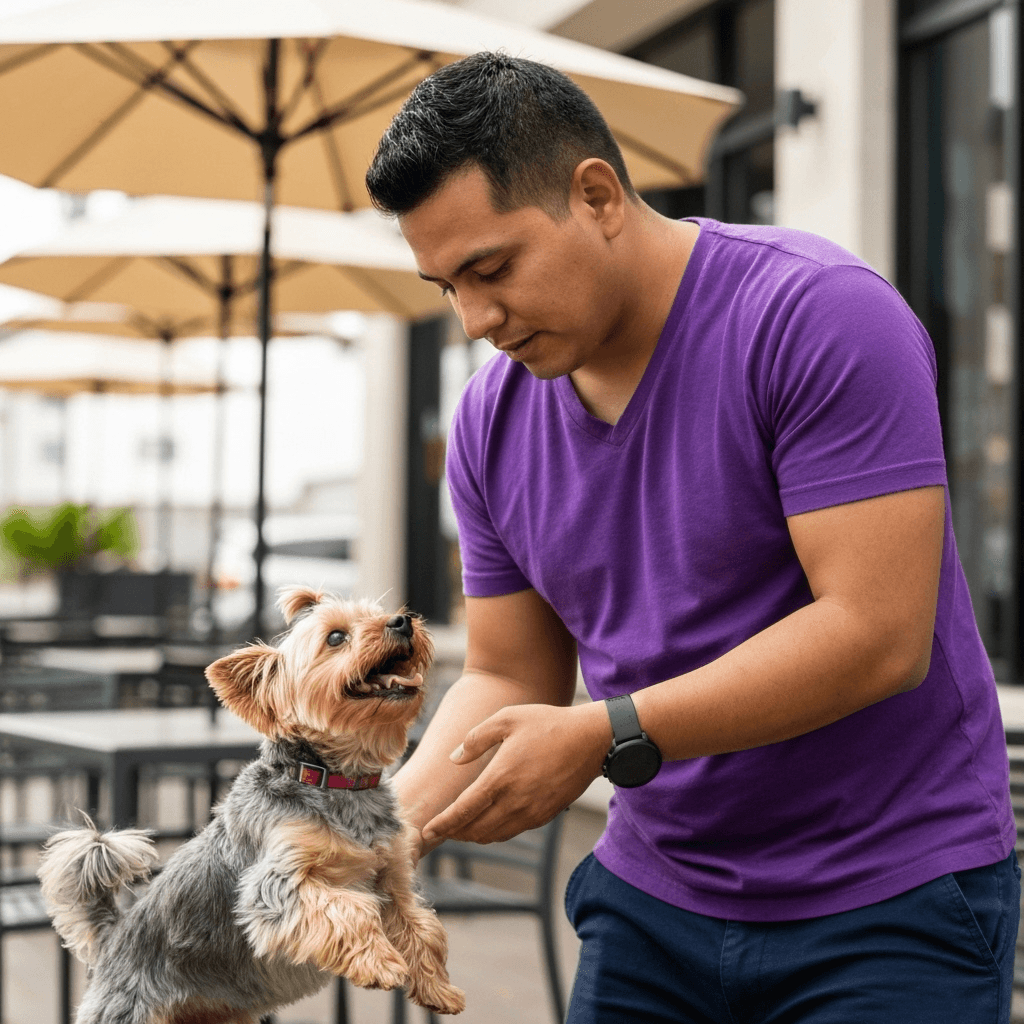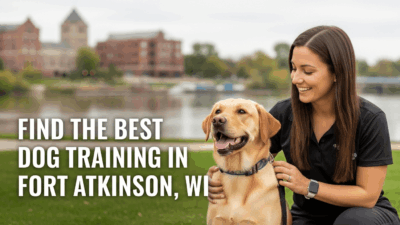Your Complete Guide to Choosing a Dog Trainer in Fort Atkinson
Finding the right dog trainer in Fort Atkinson isn’t just about teaching your dog to sit and stay. When you’re walking down Main Street or enjoying the Riverwalk with your furry friend, you want a dog who can handle the excitement of kids on bikes, other dogs passing by, and all the interesting smells that come with living near the Rock River.
The best trainers around here understand what daily life looks like in our community. They know your dog needs to be comfortable with the busy sidewalks during Bike Week, calm during outdoor concerts at Jones Park, and well-behaved when you stop by the farmers market on Saturday mornings.
How to Choose the Right Trainer
Start by looking for trainers who focus on positive reinforcement methods. These approaches build your dog’s confidence while teaching them what you actually want them to do, rather than just correcting unwanted behaviors.
Think about your specific goals before you start calling trainers. Maybe you need help with a puppy who’s still learning house rules, or perhaps your rescue dog gets nervous around other dogs on the Glacial River Trail. A good trainer will ask about your daily routine and the specific challenges you’re facing in Fort Atkinson.
Credentials matter, but they don’t tell the whole story. Look for certifications like KPA-CTP, CPDT-KA, and IAABC-CDBC for behavior issues. If your dog has shown aggression or has a bite history, ask about specialized certifications like CBCC-KA or comprehensive programs like CTC.
Consider how you want to learn alongside your dog. In-home training works well when you’re dealing with issues like door rushing when visitors arrive or barking at neighbors in your yard. Group classes can be great once your dog has basic focus skills, and they provide valuable practice around distractions. Day training or board and train programs can speed up progress, but make sure the trainer includes plenty of sessions to teach you how to maintain the new behaviors.
Common Dog Training Methods Explained

Most successful training programs in our area use reward-based methods because they create dogs who genuinely want to cooperate with their families.
Basic obedience covers the foundation skills every Fort Atkinson dog needs: reliable recall for off-leash time at dog parks, loose-leash walking for those narrow downtown sidewalks, and solid stay commands for outdoor dining at local restaurants. These aren’t just tricks – they’re practical life skills that make everything easier.
Puppy training focuses on the critical early months when your young dog is learning about the world. Good puppy programs cover house training, crate comfort, bite inhibition, and socialization with the sights and sounds of our community.
Behavior modification takes a more specialized approach for dogs dealing with fear, reactivity, separation anxiety, or resource guarding. These programs use careful desensitization and counterconditioning to help dogs feel more comfortable in challenging situations.
Private lessons let you work on the specific triggers your dog encounters at home or in your neighborhood. Group classes add controlled distractions so your dog can practice their skills around other dogs and people.
For those interested in service dog training or therapy work, expect a much more intensive program with higher standards for public behavior and specific task training. These programs require clear benchmarks and extensive practice in various environments.
Stay away from trainers who rely on intimidation, shock collars, or punishment-based methods. Beyond being unnecessarily harsh, these approaches often create new problems and can make dogs less reliable in public settings.
Average Cost of Dog Training in Fort Atkinson (Updated for 2025)
Training costs in Fort Atkinson and Jefferson County reflect the local market, with prices varying based on the trainer’s experience, session length, and whether they come to your home.
| Service Type | Average Cost (Fort Atkinson/Jefferson County) |
|---|---|
| Puppy classes, 4–6 weeks | $140–$260 total |
| Group obedience classes, 4–6 weeks | $150–$280 total |
| Private lessons, 60–90 min | $90–$160 per session |
| In-home coaching packages, 4–6 visits | $380–$800 total |
| Day training, per week | $400–$850 per week |
| Initial behavior consult | $130–$220 |
| Board and train, 2–4 weeks | $1,800–$3,800 total |
Before you commit to any program, ask exactly what’s included in the price. Some trainers include follow-up support or practice materials, while others charge extra for these services.
Questions to Ask a Potential Dog Trainer
When you’re interviewing trainers, don’t be shy about asking detailed questions. A good trainer will welcome your curiosity and give you clear, honest answers.
- What specific methods will you use with my dog, and how do you ensure training stays positive and stress-free?
- What certifications do you hold, and do you continue your education with programs like CPDT-KSA?
- How will you adapt your training to work with our daily routine and the specific places we go in Fort Atkinson?
- What training format do you recommend for our situation – private lessons, group classes, in-home sessions, or day training?
- How will we track progress and know when my dog is ready for more challenging situations?
- What are the total costs, including any travel fees or training equipment?
- Do you carry liability insurance, and can you provide proof of coverage?
- For behavior issues, will you work with our veterinarian if medical factors might be involved?
Local Rules and Practical Tips for Fort Atkinson and Jefferson County
Living in Fort Atkinson means following some basic rules that help keep our community dog-friendly. Leash laws apply in all public areas, including sidewalks, parks, and trails. Keep a standard 6-foot leash with you and always clean up after your dog.
Wisconsin requires all dogs to have current rabies vaccination and a valid dog license. You can find detailed rabies requirements at Wisconsin DHS Rabies. Dog licenses are issued by your local municipality, so check with the Fort Atkinson city clerk or your town clerk for deadlines and fees.
Barking complaints are taken seriously in residential areas, so work on teaching your dog calm behaviors and providing adequate mental enrichment. This is especially important if you live in one of the closer neighborhoods where houses are near each other.
Wisconsin doesn’t require special licenses for dog trainers, though businesses that board dogs may fall under state animal welfare regulations. You can learn more at DATCP Dog Seller and Shelter Information.
If your trainer wants to use public parks for sessions, they may need permits and insurance coverage. This protects both you and the community.
For practicing in larger outdoor areas, check the pet policies for Wisconsin state parks: Wisconsin DNR Pet Rules in State Parks.
Local Fort Atkinson Resources for Dog Owners
These local spots give you great opportunities to practice training skills with your dog. Start during quieter times of day when you’re building confidence, and always follow posted rules.
The Jefferson County Dog Park near Jefferson offers fenced areas where dogs can practice recall and social skills safely. Watertown Dog Park provides another fenced option within easy driving distance, and Whitewater Dog Park at Trippe Lake Park gives you more space for training games.
For leashed training walks, the Glacial River Trail offers varying levels of distraction and beautiful scenery. The Fort Atkinson Riverwalk and downtown sidewalks are perfect for practicing polite public behavior, especially during quieter morning hours.

Common Questions
How much does in-home dog training cost?
Most trainers in the Fort Atkinson area charge between $90-$160 for individual in-home sessions. Many offer package deals that bring the per-session cost down when you commit to multiple visits.
Is in-home dog training worth it?
Absolutely, especially for issues that happen in specific locations. If your dog barks at the mail carrier, jumps on guests at your front door, or gets anxious in your yard, working at home lets you address these problems where they actually occur.
Can you pay someone to house train your dog?
Many trainers offer puppy programs or day training that includes house training guidance and schedules. However, you’ll still need to maintain consistent routines at home to make the training stick.
What is the 3-3-3 rule for dog training?
This guideline suggests that newly adopted dogs need about 3 days to decompress from the stress of change, 3 weeks to start learning your routines, and 3 months to feel completely settled in their new home. Training expectations should account for this adjustment period.
How long will it take to reach my training goals?
Most dogs with basic manners issues show significant improvement within 4-8 weeks of consistent training. More complex behavioral problems like reactivity or anxiety typically require several months of careful work.
What should I bring to group classes?
Pack a properly fitted collar or harness, a standard 6-foot leash (not retractable), high-value treats your dog loves, fresh water, and proof of vaccinations if your trainer requires it.
What’s the leash law in Fort Atkinson?
Dogs must be leashed and under control in all public areas unless you’re in a designated off-leash zone. Keep that 6-foot leash handy whenever you’re walking on sidewalks, trails, or through parks.
Do I need a dog license in Fort Atkinson or Jefferson County?
Yes, Wisconsin law requires current rabies vaccination and an annual dog license from your local municipality. Contact the City of Fort Atkinson clerk or your township office for specific requirements and deadlines.
What shots does my dog need in Jefferson County or Wisconsin?
Rabies vaccination is required by state law. Your veterinarian will recommend additional vaccines like distemper-parvo combination and bordetella based on your dog’s lifestyle and risk factors. Check current requirements at Wisconsin DHS Rabies.
Are dog trainers required to be licensed in Fort Atkinson or Jefferson County or Wisconsin?
No special licensing exists for dog trainers in Wisconsin. Trainers operate under standard business regulations, though facilities that board dogs may need to meet additional animal welfare requirements outlined by DATCP.
Where can I practice off-leash recall?
Use fully fenced dog parks like Jefferson County Dog Park, Watertown Dog Park, or the dog park at Trippe Lake Park in Whitewater. Start during less busy times to give your dog the best chance of success.
Which dog parks allow training around Fort Atkinson?
Jefferson County Dog Park, Watertown Dog Park, and Whitewater’s dog park typically welcome respectful training activities. Keep your training sessions brief and be considerate of other park users who are there for recreation.
What beaches/trails allow dogs for training?
While Fort Atkinson doesn’t have ocean beaches, leashed dogs are welcome on most local trails including the Glacial River Trail and many state park trails in the area. Review current policies at Wisconsin DNR State Park Pet Rules.
What credentials should I look for?
Look for trainers with recognized certifications like KPA-CTP, CPDT-KA, IAABC-CDBC, CBCC-KA, or CTC. These credentials show the trainer has completed structured education and maintains professional standards.
Finding the right trainer for your Fort Atkinson dog takes a little research, but the payoff is huge. With consistent work and the right guidance, you’ll have a confident, well-behaved companion ready to enjoy everything our community has to offer.
